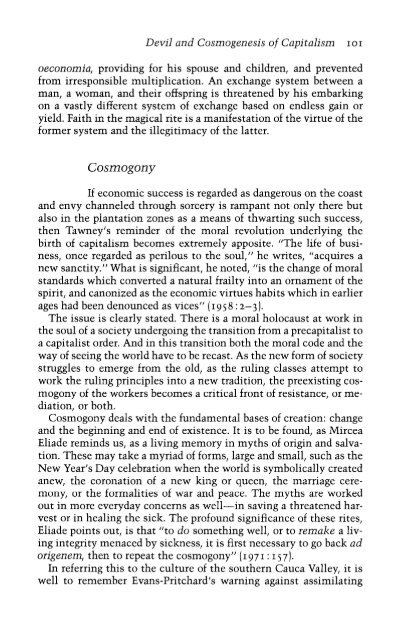The Devil and Commodity Fetishism in South America - autonomous ...
The Devil and Commodity Fetishism in South America - autonomous ...
The Devil and Commodity Fetishism in South America - autonomous ...
Create successful ePaper yourself
Turn your PDF publications into a flip-book with our unique Google optimized e-Paper software.
42 <strong>Devil</strong> <strong>and</strong> <strong>Commodity</strong> <strong>Fetishism</strong> <strong>in</strong> <strong>South</strong> <strong>America</strong><br />
the conquest, "that the conquerors became the conquered" (1951:<br />
128). That restless dialectic of magical counterattributions persists <strong>in</strong><br />
popular culture to the present day.<br />
Colonization <strong>and</strong> enslavement <strong>in</strong>advertently delivered a special<br />
mystical power to the underdog of colonial society—the power of<br />
mystic evil as embodied <strong>in</strong> the Christians' fear of the devil. <strong>The</strong><br />
quasi-Manichaean dualistic cosmology of the conquerors coexisted<br />
with the polytheistic or animistic monism of the African slaves <strong>and</strong><br />
Indians, so that the conquerors stood to the conquered as God did<br />
to the devil. Thus, the popular religion of Spanish <strong>America</strong> was<br />
stamped with ethnic <strong>and</strong> class dualisms of this momentous order<br />
—ever susceptible to mercurial <strong>in</strong>versions <strong>in</strong> accordance with the<br />
shift<strong>in</strong>g currents of caste <strong>and</strong> class power.<br />
<strong>The</strong> Inquisition was founded <strong>in</strong> Cartagena <strong>in</strong> the early seventeenth<br />
century for reasons that <strong>in</strong>cluded the Church Fathers' judgment of<br />
the colony as the "most vicious <strong>and</strong> s<strong>in</strong>ful <strong>in</strong> the Spanish Dom<strong>in</strong>ions,<br />
[with] the faith on the po<strong>in</strong>t of destruction" (Lea, 1908 :456). Female<br />
slaves served as healers to such exalted personages as the bishop of<br />
Cartagena <strong>and</strong> the <strong>in</strong>quisitors themselves, while others were lashed<br />
when their occult powers were def<strong>in</strong>ed as evil, especially when epidemics<br />
of witchcraft were rag<strong>in</strong>g. Male sorcerers (bru/'os) became important<br />
leaders <strong>in</strong> the runaway slave camps (palenques} which caused<br />
the authorities endless concern (Borrego Pla, 1973 :27, 83; Tejado Fern<strong>and</strong>ez,<br />
1954:117-32). As <strong>in</strong>termediaries for Satan, such leaders supposedly<br />
<strong>in</strong>itiated their converts <strong>in</strong> a ritual that mocked Christian baptism<br />
<strong>and</strong> denied God, the sa<strong>in</strong>ts, <strong>and</strong> the Virg<strong>in</strong> Mary <strong>in</strong> order to<br />
achieve salvation <strong>in</strong> the afterlife <strong>and</strong> wealth <strong>and</strong> power <strong>in</strong> the here <strong>and</strong><br />
now. This system of belief expresses the specter of social <strong>in</strong>version.<br />
Teleologically ordered by the Supreme God, the hierarchy of social<br />
forms def<strong>in</strong>ed by class, color, <strong>and</strong> sex engendered its mirror image <strong>in</strong><br />
the fears or hopes of an underworld allied with Satan.<br />
Blacks were notorious for their militantly anti-Christian outbursts,<br />
which were macabrely ritualized <strong>in</strong> the s<strong>in</strong>e qua non of slavery,<br />
flogg<strong>in</strong>g; at such times it was not unusual for the victim to cry, "I<br />
denounce God!" (Med<strong>in</strong>a, 1889:106; cf., Palmer, 1975). <strong>The</strong>y also destroyed<br />
symbols of the church—hardly surpris<strong>in</strong>g <strong>in</strong> a society <strong>in</strong><br />
which, for example, a woman slave owner might measure the duration<br />
of a flogg<strong>in</strong>g by the time it took her to recite her rosary (Meiklejohn,<br />
1968:216).<br />
Writ<strong>in</strong>g <strong>in</strong> 1662, the chief <strong>in</strong>quisitor attributed much of the sorcery<br />
<strong>and</strong> idolatry <strong>in</strong> the m<strong>in</strong><strong>in</strong>g districts to the heedless materialism of the<br />
m<strong>in</strong>eowners, who "live only for profit. . . <strong>and</strong> keep watch only that
















